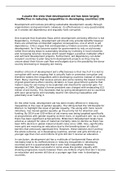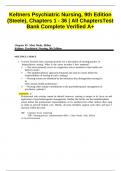Essay
Evaluate the view that development aid has been largely ineffective in reducing inequalities in developing countries
- Institution
- PEARSON (PEARSON)
This essay evaluates a variety of different methods of development aid and reasons that they have all been largely ineffective in reducing inequalities in developing countries. It reasons based on factual data that is linked to theories and gives overall strong evidence in the conclusion as to the ...
[Show more]













